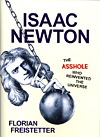- About MAA
- Membership
- MAA Publications
- Periodicals
- Blogs
- MAA Book Series
- MAA Press (an imprint of the AMS)
- MAA Notes
- MAA Reviews
- Mathematical Communication
- Information for Libraries
- Author Resources
- Advertise with MAA
- Meetings
- Competitions
- Programs
- Communities
- MAA Sections
- SIGMAA
- MAA Connect
- Students
- MAA Awards
- Awards Booklets
- Writing Awards
- Teaching Awards
- Service Awards
- Research Awards
- Lecture Awards
- Putnam Competition Individual and Team Winners
- D. E. Shaw Group AMC 8 Awards & Certificates
- Maryam Mirzakhani AMC 10 A Awards & Certificates
- Two Sigma AMC 10 B Awards & Certificates
- Jane Street AMC 12 A Awards & Certificates
- Akamai AMC 12 B Awards & Certificates
- High School Teachers
- News
You are here
Isaac Newton: The Asshole Who Reinvented the Universe

Publisher:
Prometheus Books
Publication Date:
2018
Number of Pages:
224
Format:
Hardcover
Price:
24.00
ISBN:
9781633884564
Category:
General
[Reviewed by , on ]
Peter Olszewski
04/16/2019
In Isaac Newton: The Asshole Who Reinvented the Universe, Florian Freistetter begins with a fitting quote by George Bernard Shaw:
Newton was able to combine mental power so extraordinary that if I were speaking fifty years ago, as I am old enough to have done, I should have said that his was the greatest mind that any man has ever been endowed with. And he contrived to combine the exercise of that wonderful mind with credulity, with superstition, with delusion, which would not have imposed on a moderately intelligent rabbit.
Freistetter points out that while Newton may have been one of the most important scientists (if not the most important) in history, he was also a difficult individual. Ignoring all the swearing in the book chosen by Freistetter, the book goes through the turbulent history Newton had with John Flamsteed, and with Gottfried Wilhelm Leibniz. Freistetter has done his homework on Newton and portraits Newton as conniving, sneaky, resentful, secretive, and antisocial. In addition, Newton’s strange character and obsession with religion and the apocalypse are presented.
As presented in chapter 3: False Modesty and Easily Offered: Newton the Shrinking Violet, Newton avoided the public eye and liked to perform his research in private. It was when John Collins wished to know more about Newton, especially with his research with the telescope, that Collins pushed Newton for more information. Newton would write back to Collins letters saying, “pretty easy and obvious enough. But I cannot persuade myself to undertake the drudgery of making it.” In 1665, Newton had to leave Cambridge University due to the plague and returned to Woolsthorpe where he observed the light from his childhood attic room. This was when Newton constructed a practical and working telescope with mirrors.
Chapter 4 discusses gravity and the apple – one of the greatest stories in the history of science. In addition, at the end of 1680, a comet appeared and the second round of feuding between Hooke and Newton started. On page 107, Newton called Hooke, “a man of a strange unsociable temper” and promptly set about deleting every mention of Hooke from his manuscript. Chapter 5 discusses his work Principia where he wanted to address the questions: How can motion in general be understood and explained? And how can one use this explanation to understand both the motion of the celestial bodies and that of objects on Earth? Chapter 7 discusses Newton towards the end of his life as being a warden of the Royal Mint, which left him little time for any new scientific research. In addition, in 1671, the paper Tractatus de Methodis Serierum et Fluxionum was written but was left unpublished. Newton had developed differential calculus in 1666 and Leibniz in 1676 and the rivalry of the two is presented with the Royal Society first learning about the new mathematics from Newton in 1685.
Without a doubt, Newton’s work was innovative and laid the foundations for modern physics and calculus. Was Newton unprofessional, rude, and mean? Of course, historians will have various opinions. Freistetter has put together a wonderful book with accurate notes and timeline of events of Newton. It is a great work that takes one back to a time where all the ideas of physics, science, and mathematics are coming together to what we know today. I highly recommend this book for all readers who wish to gain a solid understanding of Isaac Newton.
Peter Olszewski is a Mathematics Lecturer at The Pennsylvania State University, The Behrend College. His Research fields are in mathematics education, Cayley Color Graphs, Markov Chains, and mathematical textbooks. He can be reached at pto2@psu.edu. Webpage: www.personal.psu.edu/pto2. Outside of teaching and textbook editing, he enjoys playing golf, playing guitar and bass, reading, gardening, traveling, and painting landscapes.
The table of contents is not available.
- Log in to post comments




